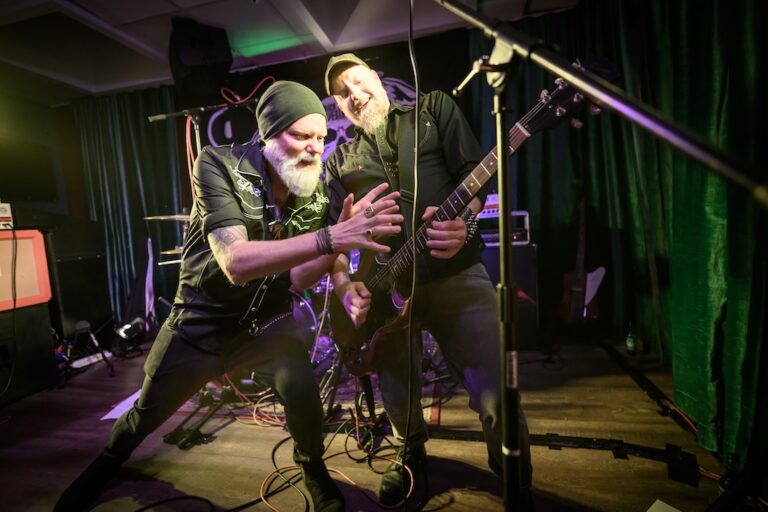‘Fight another day’ was the surprise return of 2016. After a lengthy hiatus, the Dan Reed Network, a band that uniquely combine funk, soul and rock, returned to action and immediately captured the hearts of a whole new legion of fans as well as reigniting the fire of their long-term fan-base that had been clamouring for just such a reunion for years. A band with a refreshingly positive outlook, the music of the Dan Reed Network is suffused with hope (as the impressive video for ‘Champion’ ably demonstrates) and so we were eager to speak to Dan about the long-awaited return and the inspiration from which it sparked. Speaking from the beautiful city of Prague, Dan took time to discuss the vision that underpins his work and the very potent soul that lies at the heart of the music that he makes alongside the Dan Reed Network.
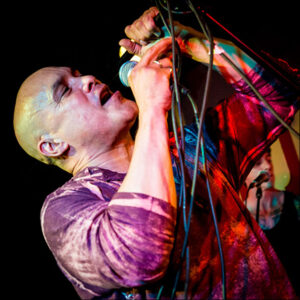
Hi, this is Dan!
Hi Dan, this is Phil, I’m phoning from the English website, SonicAbuse…
Hi Phil, good to hear from you I was expecting your call.
Well, thank you so much for agreeing to speak to me, I appreciate you talking the time for it.
Not at all, I appreciate you spreading the word about the music. Thank you!
It’s truly my pleasure. I think you’re speaking form Prague at the moment?
That’s correct.
It’s an amazing city, such a beautiful place.
You’ve been here?
Yeah, I had the opportunity to visit on my honeymoon…
Oh my god!
…we were out for about ten days.
Ah, it’s a romantic city, that’s for sure!
The one thing I picked up from ‘Fight another day’ is that it is, of course, a rock record but more than that it’s one of the most positive albums I’ve heard in the last few years. It’s full of joy and hope and I think that’s a very important quality in the music that you make.
Well, it’s an honour to hear that. I mean, I made an effort. I guess since coming back to music eight years ago with my solo material. I was in India at the time, composing material for the solo album…potential solo record… and I was going through all these really great experiences staying at a monastery and studying Buddhism at the time – I spent a year there – and then I moved to Jerusalem to finish the album and I spent three years there recording and studying Judaism and speaking with Muslims there and Christians and just learning about the things that we share and the commonality, and the things which divide us, and I hope that’s permeated with everything I’ve done in the solo record and in the new DRN record, so it’s really nice to hear you say that.
I saw that you’d travelled and spent time away from music and I was interested about your journey back to music because with some artists there’s a juxtaposition between that desire to entertain and that need to inform as well and I was wondering if that’s something that led you back into music?
In a way I guess… I would say ‘yes’ to that, but also I don’t see it so clear like that. It’s more of a personal intention. I feel that, if I’m going to do music again, as opposed to what I was doing in the past which was more about commercialism and merchandise and marketing and trying to find a hit song and photoshoots and trying to sell the music as opposed to trying to create the music – that all chased me away from the business for quite a while – so when the idea came of going back towards p[laying live and recording and writing, it really came down to a mission statement that I’d written in a journal that I carried with me on my travels and the mission statement was very simple – “if you’re going to do music it should be songs that inspire, that nurture balance, embrace compassion as opposed to violence as a way to solve internal issues within myself” and so, when I’m writing a lyric these days I’m always asking if it holds true to that mission statement, or if it deviates from that because, otherwise, I’m just doing it to either make money or to get attention or be loved – those things I felt I needed when I was younger. So it’s now about trying to take advantage of this great opportunity to play music and share this theme… this intention of us surviving as a human race as opposed to building walls and dividing ourselves up.
And a really good example of that intention, I think, sits at the heart of ‘Save the world’ which has that great lyric which is full of hope and yet a great melody that is really infectious, it’s a great poppy, hooky song.
Oh thank you. That’s one of Brion James’ songs – he wrote that on Honduras, in fact he’s still living there, and you can feel that energy that he’s down on the beach on the island there. There’s a lot of optimism and hope in that song and also very pointed ideas, especially in the bridge section where he’s talking about ‘who’s going to save the world?’ will it be Muslims, Jews, Christians? Which tribe? Which culture? Which religion? Which political point of view. Yeah, Brian is a kindred spirit, we both pine for the same future.
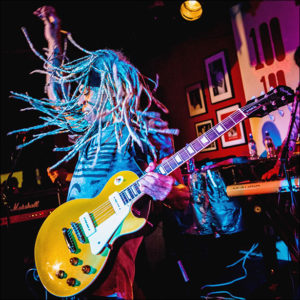
The other thing that was interesting about the recording of the album, you said that you nurtured this sense of energy, and on this album, I think it’s the first DRN album where your drummer, Dan Pred, played on his own rather than against an electronic backdrop.
Yeah, I hope so. We… Dan Pred was probably the least familiar with the arrangements because I was sending songs back and forth with Brion as we were composing together; with Melvin, who was laying down some bass parts; Rob Daiker and I have worked together on all my solo records as well as on this record, he’s now in the band as a keyboardist, so we had a lot of communication. Dan Pred is constantly working on his other business (he’s a film-maker), so he was quite swamped and when it came to about two weeks before the record he asked if we were ever going to send him the final demos, so he had about a couple of weeks to listen to them and then, when we were in the studio, he was pretty much learning the arrangements as we sat there. We’d go through it with the note pad and he’d write down the arrangements and then he’d go back into the studio and he’d do three, four, maybe five times and each take he’d do something different, and I like that kind of spontaneity as opposed to working out all the drum fills and having everything just calculated and perfect. The energy on the album, I feel like Dan’s drum performance is fantastic.
There’s always, I think, a temptation, particularly in the studio, to iron out every kink but, as you say, you do lose that energy and spontaneity and first and foremost, ‘fight another day’ is a rock record…
Absolutely, I kind of embrace that idea more and more as the years go by and also I’ve learnt a lot form other artistic formats such as film-making or authors, writers, dancers… I remember this great quote from… I think it is either Michael Cain or Gene Hackman maybe, one of these great actors, and he talks about this idea that you learn the lines, you memorise the dialogue, but they don’t rehearse it. They want to rehearse it with the other actors on camera, take one, because that’s when lots of the magic happens, when you first experience it. Because every conversation you have in real life is not rehearsed and that spontaneity is what makes great acting read well on screen. I always thought that that’s the same thing as when I’m making demos. Because when I’m playing demos, often times we’re going back and trying to capture that energy that’s in the demo, whether it’s a guitar performance or a vocal performance. When I’m cutting all my demo vocals, the guys are always telling me I sang it better that first time in my studio, in my house… so we have to go back and try to recapture that or salvage those demo takes and that’s always a challenge, so yeah, spontaneity is key to making a really good record of any kind I guess. Even people making an electronic record like Future Sound of London, they’ll just jam for fifteen –twenty minutes on a part and then they’ll go in and sample and cut and paste pieces that were stellar, that were excellent.
That’s possible one of the things that’s both an advantage and a disadvantage – you’ve got all those things in your home that, 20 years ago, would have been prohibitively expensive which allows you to prepare but you do also lose that performance edge and music is so much about that creative spark.
You can definitely get lost in the technology, that’s for sure. I work with Logic and Pro Tools and you can sit here all night just experimenting with the snare drum sound and it’ll drive you crazy. I did a bunch of electronic music between, I guess, ’97-2001, about four years where there were no vocals – just drum & bass and any type of breakbeats; I wasn’t into house so much; and that taught me a lot about getting lost. You can get lost in creating production values for a track and lose sight of what it is you were trying to say in that piece of music. So thankfully… hopefully and thankfully I learned that lesson back in those days.
There is something mesmerising about sitting down and producing a piece of music from scratch in that way.
Yeah, I love it. I dream of… I’m releasing a new ambient, instrumental record. I t doesn’t have too many drum beats to it, but it’s more of a contemplative, meditative record that I worked on last year and I’ll be releasing next month and I just… I love the landscapes and the ambience… the worlds you can go into in electronic music. SO maybe someday I’ll do a proper dance record, a groove record.
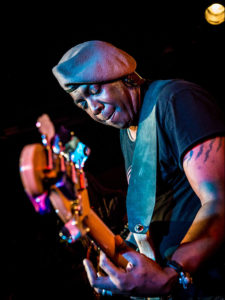
That’s really interesting. I’ve liked Future Sound of London for many years and ‘Dead Cities’ is an amazing record in particular.
That’s my favourite electronic record of all time. That album!
One of the things for me – I grew up in the mid-90s and one of the great things about music at that time was that it was a time of experimentation and you could mix genres almost at will – you had bands like Red Hot Chilli Peppers, Faith no more, yourselves and today, even with the near-infinite possibilities of the internet it seems more ghettoised than ever. I was wondering if there was a niche into which you felt the DRN could return.
I guess… I didn’t consciously think of that, but people, when I was playing songs like ‘get to you’ for example, a really simple, straight-ahead dance track from the Network. Inane lyric really, very childish and playful and what have you and I was playing it at my acoustic shows and I’d have these kids that were sixteen say how much they liked the song and they’d say I should record it and release it and, of course, I had, long before they were born! So, I started thinking that maybe the rock / funk thing we were doing twenty-five years ago was, not necessarily ahead of its time, but definitely looping back around to where, if we did a new album, it might connect with people. So I guess that did feed into the narrative of wanting to do a new album.
Were you surprised by the reaction the album got – it received seemingly ubiquitously positive feedback, and deservedly so, but did you expect it to resonate, not just with fans who had been clamouring for a reunion for years, but also with a whole new audience in the way that it did?
Yeah, we hoped for that when we were making the record. We talked about it a little bit, when we were making the record, saying that it would be really nice to connect with another generation and hopefully… it’s a more about the thematic intention of the songs that I was questioning – whether they would be into that. It seems to be so much of a culture that’s addicted to the Kardashians and X Factor and immediate gratification and I was wondering if these themes would resonate with this new generation. But so far it’s been really positive feedback.
Again, you talk about these themes and, in various interviews, you’ve talked about the meaning behind the title and you’ve got that superficial, DRN ‘we’re back!’ but there’s also the deeper meaning that humanity has to ‘fight another day’ and that’s clearly something that resonates deeply with you.
Yeah, even more so since my son was born four and a half years ago, his name is Joshua and I remember, before he was born, I had this… more of a blind optimism. An idealism where we could do music to help save the world, that kind of thing. After my son was born it became much more personal, like, how do we, as a human race, survive these many challenges that are coming on the horizon for us? Whether it’s environmental, whether it’s religious battles, whether it’s profit over humanity and million s and millions of people being desperately poor whilst 1% of 1% holds the wealth and the holds the media in their pocket and tells us which way to go and what to wear and how to think and feel. Is this the kind of world I want my son to grow up into? And now I’m thinking about these themes and the lyrics of these songs and it’s about something that he can listen to when he’s fifteen / sixteen and hopefully he’ll think “yeah, this is stuff my dad wrote back in the day…” and hopefully it’ll be some kind of fire for him personally as opposed to trying to save the greater world. It’s more about handing him some tools to work with.
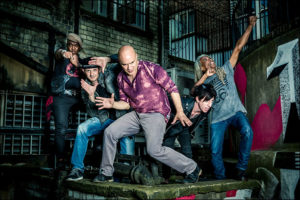
It’s interesting to note that at times of political turmoil, there’s always an upsurge in politically aware and articulate bands at the expense of bands who are, perhaps, lyrically more superficial – perhaps that’s what helps younger people to deal with the environment in which they find themselves.
I certainly hope so. I know when I was a kid there were so many influences on me. I remember seeing stories about Ghandi when I was a little kid and thinking about JFK. I remember, as a seven year old, this mythical character of John F Kennedy who stopped a nuclear war and was killed the same year I was born and I remember thinking “Wow! I wish I could have met that guy!” and I remember I started thinking about our mortality – that we’re only here for a while because when you’re a little kid you think you’re going to live forever, but I remember thinking that he was someone I wished I could have met and… I yeah, I do hope that we’re handing these future generations some kind of folk lore and history and stuff that we went through and that’s something they can use as a foundation to build on.
I think that kind of idealism… music and words; literature… they can change things and I firmly believe and hope that there’s a place for it.
Well yesterday, you know, Meryl Streep talked about… did you see this whole thing with her?
Yes, it’s been heavily discussed. It’s a bit of a whirlwind, it seems, and the reaction to her comments was very unpleasant.
Yeah, yeah, I mean I posted it on my Facebook page because I was moved by her intention and what she was trying to say – that empathy is being attacked; compassion is being attacked; liberals being called ‘snowflakes’ and ‘libtards’ because we believe in coming together as opposed to just being tough guys out there in the world… tough, rich guys. And I got a lot of positive feedback and then some people just unfriended me, or what have you, because I supported that statement or people saying that she’s a hack and doesn’t know what she’s talking about. And I’m just like “Wow!” She’s the most… she’s won more academy awards than any actor or actress in the history of movie making and she’s a hack?! Including Donald Trump – “The most overrated actress in Hollywood.” Donald, just last year you were saying she was one of the greatest actresses in Hollywood! When someone criticizes you, they’re your enemy now as opposed to trying to learn from that critique? I don’t know.
But that seems to be a global phenomenon now. There’s the echo chamber effect where people unfriend you because you’ve said something that they don’t like or you’ve made them think in a way in which they don’t wish to engage. But perhaps music can cut through that because sometimes, you may not be aware that there’s a message to take in, but it’s there and perhaps that can be positive.
My favourite comment was someone said to me that they really liked my music, but my politics suck! And I was thinking “well, guess what – all my politics is in that music!” So, maybe I’m getting to people subtly – maybe the melody or the chord change or the drum beat helps the message to get out there.
You’ve got a tour coming up in the UK in March I think…
Yeah, we’ve got a UK tour coming up and it starts, I think, in Swindon and then the last date is in Nottingham, and we’re really excited because we’re doing something like eleven dates in the UK. Usually we do two or three.
Yeah, it’s quite a big tour so clearly people are excited to see you!
Yeah, the ticket sales are going good and we’re doing this on our own, without a big promoter, so it’s an experiment to see how much we can keep it in house, keep control over the situation and have some fun with it.
And you’ve got a new video out for ‘Champion’, I think, which is promoting the album and the tour.
Yeah, that was crowdfunded through Pledge music and I think it was funded within a couple of weeks, out of a three month campaign and that kind of support from everyone around the world, including the UK, was fantastic. We were truly honoured to have so many people behind us wanting to create new music and new videos and that wouldn’t have been possible without the people who enjoy our music.
That’s such a wonderful platform because it allows fans to not only enjoy more music but also feel a part of the creative journey as well.
Yeah. This album’s on Frontiers records and much respect to them for giving us this opportunity to create the album, for sure, and the first couple of videos were also part of that whole Frontiers thing. But to be able to do this joint effort with Crowd funding was fantastic. I have nothing but good things to say about Pledge. Some of the people that are working there are former… I don’t know if they are execs… but definitely people form the old record industry and they realised that that paradigm was changing and shifting and they wanted to be more fair to artists, which I have nothing but respect for, and there are a lot of artists working with Pledge as well within the corporate structure. So they’re a great company and I plan on working with them as much as possible in the future.
I’m hopeful that we can see that new model develop for artists because it is so difficult to get new music to an audience. Hopefully this is just one of many ways of changing that rather than Spotify or whatever.
In Spotify – it’s fantastic that everyone has access to their favourite artists at the push of a button. The only thing with Spotify is that it’s just so unfair in so many ways to the artists with how they are collecting money and distributing money. So I hope that can change. It would take a coalition of all the artists on Spotify to get together to ask them to change. But perhaps that’ll happen in the future.
OK, my last question because I know I’ve taken up a lot of your time, obviously you’re still in the middle of promoting ‘fight another day’ but a lot of people were so excited to see the DRN back together again… is it too early to ask about plans for the future?
We’re already talking about 2018 for a new album, just every two years or so is the plan. So yeah, I was up late last night until about six in the morning working on new stuff – a new solo song and a new DRN song – so, it’s going to be another year of writing, I guess, and being on the road and then we’ll get back in the studio about this time next year.
Dan Reed is on tour in the UK in March, see the poster below for dates and venues:

